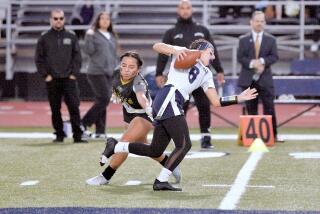Alabama Towns Shaken by Charges of Fixing : Investigation Results in Controversy, Concern in Prep Football-Happy Area
- Share via
FLORENCE, Ala. — High School football is important to the tiny farm towns of northwest Alabama.
“When Town Creek High School is out of town, you could not get enough people around here to put out a grass fire,” said Robert Terry, a local aficionado .
But this summer, football talk is not only about playing. It is about fixing. And if allegations are true, these towns and their football games may never be the same.
“I’m not naive enough to believe that there hasn’t been gambling going on,” said Roger Gargis, owner of the Leighton Grocery & Deli. “But to say that games are being fixed, that’s ridiculous.”
Such talk began after the FBI had seized more than $1 million in alleged gambling cash and property as part of an investigation into bookmaking in several north Alabama cities.
When the two-year investigation became public, Florence Police Chief Rick Thompson said it had uncovered allegations--not hard evidence--that some high school coaches and officials conspired to fix games, perhaps altering yard sticks and game clocks.
No charges have been filed, and Thompson has not named names or schools.
Thompson was on vacation last week and could not be reached. A secretary in his office said he left word that there would be no further comment on the investigation.
“Rick bit off a little more than he could chew,” Robert Terry said. “He likes to get his name on TV.”
Still, it is difficult to overstate the stir Thompson’s remarks caused.
Friday nights are football nights and if your local team is part of “championship row,” it is all the more reason to eat early and head for the field.
Colbert County High in Leighton, about 10 miles southeast of Florence, won the Class 5-A state title in 1985 and has reached the semifinals the last two seasons.
“It’s a losing season if we don’t go to the playoffs,” said Shorty Ford, owner of the Leighton Cleaners.
“You can’t find a seat over there on Friday night,” he said, alluding to C. T. Manley Stadium, the 4,000-seat home of the Indians.
“Football . . . means virtually everything,” said Gargis, the deli owner. “The school has been very successful, winning its share of championships. The community takes a lot of pride in that.”
Travel east about 10 miles to Town Creek, home of the Hazlewood High Golden Bears. Their resume is impressive, too: Class 2-A champions in 1988 and winners of four state titles this decade, more than any other school.
Drive east another five or so miles and there’s Courtland, with fewer than 500 residents and a high school team that won the Class 1-A state title last season.
To the players who will defend that title this year, the possibility that games were fixed is unbelievable.
“If somebody asked me (to fix a game), I wouldn’t do it,” said Johnathan Orr, a junior who hopes to start at quarterback or free safety this season. “I like to win.”
Terry, who said his life consists of “attending sports and fishing,” is convinced that no high school games have been fixed, at least not in Town Creek.
Others in the state’s prep athletic world, including Herman Scott, director of the Alabama High School Athletic Assn., are concerned that the image of prep sports in the state will be marred by the allegations.
“I’d be the most surprised man in the country if it comes up that they were fixing high school football,” Terry said. “I’m not saying it can’t happen. I’m just saying that there’s not enough money bet on high school football for it to happen.”
But what if Thompson’s investigation reveals games were fixed?
“It would be like the death of somebody’s parents,” Terry said.
More to Read
Go beyond the scoreboard
Get the latest on L.A.'s teams in the daily Sports Report newsletter.
You may occasionally receive promotional content from the Los Angeles Times.










